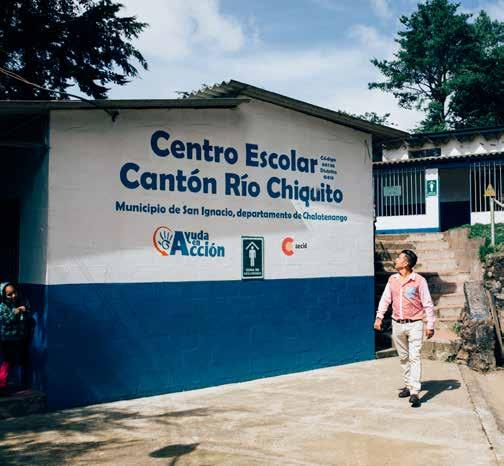
3 minute read
We have been supporting the project from day zero until now
- Can you let me know when we get to Río Chiquito? He said to the bus driver.

Advertisement
- Who are you going to see?
- Don Walter
- The one with the books?
Walter Tadeo is the librarian at the Cantón Río Chiquito School Center, located in San Ignacio, Chalatenango, an area filled with pine trees that has a cool climate. ConTextos installed a library there and trained teachers as well as the community. “We have been supporting the project from day zero until now,” he says.
Before the pandemic and quarantine, in Río Chiquito all grades had one hour of reading during class and the young people took a book home and met on Thursdays to discuss it.
Children and adolescents have been more excited about books and readings. Perhaps they were unaware of how fun reading can be because no one reads anymore
The house-to-house reading program had also been implemented. “There are some people who sometimes don’t even know how to read, so there you go”, says Walter, who reads aloud, with enthusiasm, with pauses, imitating animals.
He also visits classes to read in the absence of another teacher.
Ever since the library opened at the school “children and adolescents have been more excited about books and readings. Perhaps they were unaware of how fun reading can be because no one reads anymore; everyone does it on the internet in Google”, says Walter.
Now the library is divided into classrooms because an initial education class was enabled there. We find books even in the Director’s office, as classes resume after the pandemic and quarantine, reading is also resumed.
With the reading project in the classrooms, Río Chiquito won the Golden Mango Award, a recognition that ConTextos gives to teachers for their innovative projects that transform the reality of classrooms.
Jimmy wrote his book “The Sardine Can Scale” in 2020. He remembers that the sessions of “Soy Autor/I am an Author” began on August 8 and ended the first week of February 2021. He finished writing the book and exited the Quezaltepeque prison on February 4th. He had spent 13 years and 4 months in prison. Today, on the outside, he is more afraid to return to that place than to run into people who might want to take his life.




When I wrote the book, it’s like I had taken a stone out of my backpack,” he says, “and even though there are more (stones), it was heavier than the others.
To write a memoir in the “I am an Author” program, first you have to choose a topic. At first Jimmy thought about telling a story of danger that he had lived, but chose to talk about his childhood. He had a stepfather who beat him until he was too tired to continue. He spent a lonely childhood; his mother seemed to love his siblings more than him.
The title of his book is an anecdote from his childhood.
One day at school, the teacher asked the students, with the help of their parents, to make a scale. Jimmy made a scale on his own. And without any help, he opened two cans of sardines with a knife and connected them with a string using his yo-yo and a hook.

When he brought it to school, he felt ashamed of his work and some of his classmates made fun of him.
The teacher saw the completed projects and began to ask whose they were.
The teacher gave the class a 9 out of 10 for their work, but Jimmy received a 10 because he had done it alone. He ran out of the classroom crying.
“When I wrote the book, it’s like I had taken a stone out of my backpack - he says - and even though there are more (stones), it was heavier than the others”.
Writing also helped him to find common ground with others, those who participated in “I am an Author” ended up talking to people they believed to be enemies.
“It helped me a lot -a lot! I would like to go back in time but with the mentality that I have now, because if I had kept doing the same thing I wouldn’t get anywhere - he says - I would have stopped doing a lot of stupid things and instead do things that I didn’t do, because I missed several opportunities”.
He made amends with his stepfather, would like to meet his teacher again and, still, when he reads or remembers his story he feels a lump in his throat.


Chayito, Author










